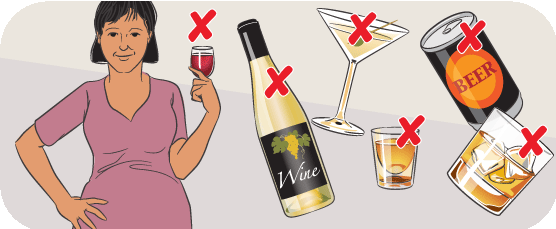Pregnant and Taking Alcohol? Think Again!
By Caroline Kahiu
Decades ago, alcohol was thought to be safe to consume during pregnancy. Ask a member of one of the older generations, and they might tell you that having a drink now and then during pregnancy is safe, but modern research shows that this is not true. Alcohol consumed by the mother enters the baby’s bloodstream in the same concentration, meaning that the mother’s alcohol concentration is the same as the unborn child’s. In addition, it takes the baby’s body twice as long to eliminate alcohol from its system.
It is true that some women may drink alcohol during pregnancy and have babies who seem to be healthy. Some women may have very little alcohol during pregnancy and have babies with serious health conditions. Every pregnancy is different. Alcohol may hurt one baby more than the other.
According to the Centre for Disease Control (CDC), there is no known safe amount of alcohol during pregnancy or while trying to get pregnant. There is also no safe time for alcohol use during pregnancy. All types of alcohol are equally harmful, including all wines and beer. Despite these facts, drinking during pregnancy has actually risen in the last decade.
Alcohol is a teratogen- an agent that causes an abnormality following fetal exposure during pregnancy and can interrupt an unborn baby's normal development. Alcohol use when pregnant can cause a range of lifelong physical, mental and behavioral disabilities, known as Fetal Alcohol Spectrum Disorders (FASDs). It can also cause miscarriage, stillbirth, premature birth, and low birth weight.
FASD is an umbrella term used to describe a range of life-long disorders that can result from a baby being exposed during pregnancy. They include abnormalities of the face such as small eye openings, flattening of the ridge between the nose and lip, and a thin outer lip. Behavioral problems associated with FASD are common and often misunderstood because some look like intentional opposing behavior when they are underlying neurodevelopmental abnormalities.
Unfortunately, there is no cure for FASDs but getting help early can help improve a child’s behavior. When it comes to caring for the mother and the baby, alcohol must stay off the table. Instead of treating the child as oppositional, reframing helps care providers understand that the child may be unable to do what they are asked because of working memory deficits or other cognitive impairments.
FASDs are 100 percent preventable. The best way to keep your baby safe from problems caused by alcohol during pregnancy is not to drink. A woman should also stop drinking at once she thinks she could be pregnant. The other strategy is alcohol screening and brief interventions that involve asking questions about drinking patterns during prenatal clinics.
While careful conversations can help, stigma continues to be a challenge. Discomfort prevents women from seeking help for alcohol dependence and may prevent them from pursuing a FASD diagnosis for the child. Addressing negative perceptions about alcohol use during pregnancy is an important step toward reducing rates of FASD ultimately improving lives for people with these conditions. It’s paramount to seek help from professionals who can help to make sure the mother and baby will stay safe and healthy throughout the pregnancy.
Published: Daily Nation 01/09/2022

